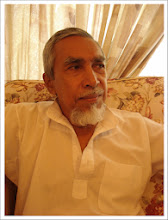1. “Begin nothing without considering what the end may be.” My father, M. I. Merican, quoted this Persian proverb in his speech at the adjournment of the Kedah Council of State meeting on September 6, 1951 to prove his point: before we enter upon any undertaking we ought to weigh its consequences.
2. A brief newspaper report in the Straits Times dated 7 September, 1951 on
page 7 under the headline “Dato Onn’s plan ‘absurd’” read thus:
ALOR STAR, Thurs.-The social economy and educational and political position of the Malays were so precarious that it was absurd to speak of self-government in seven years as visualized by Dato Onn bin Ja’afar, said Inche Ismail Merican, Malay Unofficial, at today’s Kedah State Council meeting.Speaking on the improvement of the economic status of the kampong people, Inche Ismail urged Government to improve their economic position and to train them in rural industries.
3. Later I found a fairly lengthy newspaper
report of the same event in the Straits
Echo & Times of Malaya dated September 7, 1951 under quite a different
headline “CASE FOR MUKIM COUNCILS, LAND BANKS.” It covered much of the words of
my father’s speech.
4. In the speech, M. I. Merican brought up
again the case for Mukim Councils and Land Banks which he had put forward in
previous speeches on August 1, 1948 and April 6, 1950 respectively at the
Council of State meetings. He inquired as to whether action had been taken
regarding his suggestions made in the Council about the creation of Mukim
Councils and Land Banks.
5. Stating that the theme of both his previous speeches
was “the training of the rural people in self-government on democratic lines
and the development of their economy,” he reiterated that Mukim Councils would
have a wide scope of work dealing with pasturage, sanitation and health,
co-operative padi-planting and other industrial pursuits.
6. M. I. Merican further stated that having
anticipated the establishment of RIDA at that time, he suggested the creation
of a Land Bank to be financed by the Colonial Development Fund. Realizing that
RIDA had come to stay, he was hopeful that that “should be a great
encouragement to rural people in the hope that they may obtain financial
assistance in the development of their industrial and agricultural pursuits.” He
was also hopeful that RIDA would “train them in the art of trading and
processing of their agricultural produce.”
7. Going against the crowd, he quoted a report
in the Press that the Federal Government had failed to finance RIDA adequately.
He pointed out that lack of funds would mean that “the work of RIDA in
improving the economy of the rural people especially the Malays, would be
seriously retarded.”
8. He added that backwardness in commercial
enterprise, would place the economy of the rakyat at a very low standard and that would stifle the progress of their
education. He maintained that it was “absurd to speak of the attainment of
self-government in Malaya within seven years as visualized by a Malay leader” when
the social, economic, educational and political position of the Malays was so
precarious.
9. Regarding the progress of RIDA, M. I.
Merican asked “that the branch of RIDA in the State apply for sufficient funds
to assist the industrial and agricultural pursuits” of the poor people and to
train them in their rural industries.
10. Pointing out that “too much talking and
writing has been done with too little practical and concrete action,” he
suggested the cultivation of economic plants such as sugar-cane and coconut. In
view of the shortage of sugar and its price being too expensive to most of the
inhabitants, he suggested that RIDA
should encourage the rakyat to plant sugar-cane and train them to manufacture
cane sugar in small mills. He pointed out that the Department of Co-operative
Development could help by teaching the rakyat how to run their small mills on a
co-operative basis.
11. Regarding padi, he said that the rakyat “should
be taught how to mill padi into rice in small mills on a co-operative basis,” and
likewise for oil mills. Maintaining that most successful industries had small
beginnings, he said that it would be useless to start those industries on a big
scale.
12. M. I. Merican was hopeful that RIDA combined
with the Department of Co-operative Development would “set to work on the lines
indicated for the benefit of the rakyat.” Improving the economy of the people, he maintained,
would “result in raising their standards of living and affording facilities for
their acquisition of social, political and educational progress.”
*RIDA = Rural and Industria1 Development
Authority
rakyat = the people
padi = rice before husking












